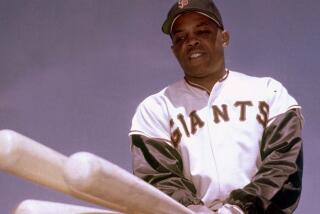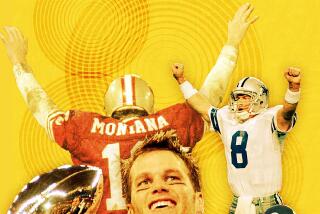He Gave the NFL a Legacy of Class
- Share via
You could see his face up there on the big billboard over Broadway. His pearly ten-gallon hat was tilted down over his tanned and weathered face as he cupped his hands to light a cigarette. Charlie Conerly was tough as rawhide.
He was Gary Cooper, or John Wayne or Montgomery Clift in “Red River.” He was, indeed, the Marlboro Man. His name never appeared; it was understood. He was quarterback for the New York Giants in the instant pro football came into the Golden Age, but mostly because he fit the part.
“He was a silent leader,” said Sam Huff, whose violent-world defense gave Conerly’s team the other ingredient for winning. “Charlie never talked to anybody. He came in, sat in front of his locker and read the paper. Some people thought he was grumpy; he just didn’t talk.”
Almost never. Huff came to Giants camp in 1956 as a rookie who played a lot of linebacker and punted some, too. Conerly was graying and 37. “I first thought he was a coach,” Huff recalled. “I said, ‘Hey, coach, where’s the balls?’ And he said, ‘Ahm no damn coach, rookie.’ ” Some things a man never forgets.
“One word,” recalled Jim Trimble, former Giants scout and a coach in the league when Conerly was at his best. “He was the toughest SOB at quarterback. You could never physically hurt Charlie; if you did, he was never going to let you know about it.”
Chuckin’ Charlie died Tuesday at the age of 74. He played in four NFL championship games in 14 seasons from 1948 to 1961, gallumphing around in his old high-top shoes. They were his team records that Phil Simms broke for completions, for touchdowns and for criticism. They were alike in so many ways.
For the purpose of introducing Conerly a few years ago at a misty-eyed dinner, Simms went to the trouble of reading the clips. “I had thought he was God up here,” Simms said. “I started reading and I thought, ‘Hey, this sounds like me.’ ”
There were times when Conerly was derisively named “Good Old Charlie,” and fans cheered when he got hurt. “But you never heard one word of complaint,” Wellington Mara, who ran practice patterns for Conerly in those formative years, said with admiration.
Conerly came to the Giants from Mississippi and played tailback in the A-formation when the T-formation was still newfangled. Actually, the Washington Redskins had drafted him when his class graduated in 1945, but he was away with the Marine Corps on Iwo Jima. When he finished at Mississippi, the Giants traded for him in 1948.
Steve Owen hired Allie Sherman to teach the T to the coaching staff and Conerly. “I met him, he was in bed reading a Western,” Sherman said. “He looked up at me and said, ‘OK, fine,’ and went back to his book.
“I learned his span of attention was not much past 12 or 15 minutes, and he wasn’t much for chalk. I’d tell him about ‘flood to the left’ and he’d go ‘Yep,’ and I’d worry. Then when he went on the field in an hour he was like a computer.”
Conerly quarterbacked the Giants to three conference championships and a tie for another, and pulled out some games as a backup to Y.A. Tittle in another championship. He was the man when the Giants won the 1956 equivalent of the Super Bowl.
But the word that rings through the history of the Giants is not that he won but that he was “class.” Mara recalled Tuesday that the way Conerly, in the twilight of his career, accepted the arrival of Tittle “was indicative of the type of player he was.”
In 1961, Huff recalled, Wellington, who made the great trades, stood amid the defensive players and asked them: “We have a chance to get Y.A. Tittle, what do you guys think?” All they had to give up was a trivia answer named Lou Cordileone. There were 11 quick votes of yes.
And then came the test of what a man had inside his chest as well as in his head. “When you practice or play against a team, you watch how the quarterback reacts and whether he can bring that team up to capacity,” said Andy Robustelli, who came to the Giants as a defensive end for the ’56 championship season. “What I saw was the confidence he instilled in the huddle.”
Sherman taught the lessons of the T to Conerly, went off to make his own name coaching in Canada and came back to replace Vince Lombardi when he went to Green Bay. The year Sherman became head coach was the year Tittle came from San Francisco. Of course the Giants were cool to this outsider; they’d won with Conerly. Both Conerly and Tittle had been No. 1, and there was no sharing the job.
Two weeks before the opener, Sherman recalls he asked both men to come in early to camp at Fordham the next day. “We met in the girls’ powder room of the gym,” Sherman said. “I closed the door and said the coaches feel we can make a run at the championship and there are three guys who can help us or hurt us most: the three of us.”
He said he’d pick a No. 1 strictly on football; the guy he didn’t pick would have the toughest test to stay sharp for the fifth game or the 12th or a game that may never come. “You both have a right,” Sherman said, “to tell me to shove it, and if you want to go somewhere I’ll help you.
“Charlie looked down, scraped his cleats and said, ‘I’ve won and I want to win again; whatever you say goes.’ And Tittle said, ‘Shoot, I never won and I want to win, and whatever you say goes.”’
Conerly opened the season. Sherman went to Tittle in the second game. “Four games we were behind at the half and went to Charlie and won the game,” Sherman said.
“He had this strength of character; all his life he’s No. 1 with these teammates, he rides the bench and he pulls us out. He gave me chills.”
Conerly was never named all-NFL. He led the league in passing once. Mara calls him the best player not in the Pro Football Hall of Fame.
Conerly was at quarterback in the four-week sequence in 1958 that created pro football. In the 11th game--they scheduled 12 then--the Giants beat defending champion Detroit with Bobby Layne and Doak Walker. Conerly was the holder when Pat Summerall’s kick in the snow beat Cleveland to force a conference playoff.
With Huff playing shadow, the defense held Jimmy Brown to 8 yards, and the Giants won the conference. Then they played the overtime game with the Baltimore Colts, known as “The Greatest Game Ever Played.” The world remembers Johnny Unitas picking the Colts downfield in sudden death; it should not forget Conerly passing the Giants to a lead in regulation.
He had a hand in the creation. In ’58 the Giants sold 11,000 season tickets. By mid-’59 they were all sold, and have been ever since.
That’s some of Conerly’s legacy.
More to Read
Go beyond the scoreboard
Get the latest on L.A.'s teams in the daily Sports Report newsletter.
You may occasionally receive promotional content from the Los Angeles Times.










